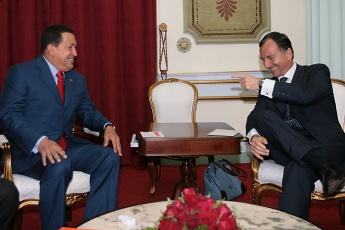|
During an official meeting in the Miraflores presidential palace, the Venezuelan Ministry for Housing and Public Works and the Italian Ministry for Infrastructure and Transportation signed a document to “express their commitment to honor previously contracted obligations.”
Another agreement was signed to provide education and technological training to “the communities adjacent to the railway lines of the national railway plan,” according to the Venezuelan Information Ministry.
“Italian companies have helped us so very much in the area of railways, and we want them to continue helping us,” President Hugo Chavez said as he addressed the Italian delegation. He said Venezuela is willing to increase its supply of oil and natural gas to Italy.
The Contuy Medio Consortium, made up of Italian, Venezuelan, and Japanese firms, has been in charge of railway construction including lines to connect Venezuela’s La Encrucijada and Valles del Tuy regions, as well as Caracas and the port city Puerto Cabello, since 1996.
The projects have stalled in recent years as the result of a lack of financing, according to local news reports.
Last Sunday, Chavez said he will not accept the stalling of the projects any longer, and demanded that the Italian companies look for financing independent of the Venezuelan government.
“Those companies have the means to seek financing, and they must do it; they can’t put the whole burden on the national budget [of Venezuela],” Chavez said during his weekly talk show, “Aló, Presidente”.
Chavez also called on Italian Prime Minister Silvio Berlusconi to help the seek financing for the projects. Italian Ambassador Luigi Maccotta, who was in the audience during the show along with officials from the Italian firms, promised to speak with Berlusconi on the subject.
During Thursday’s binational meeting, Italian Foreign Minister Franco Frattini delivered a letter to Chavez from Berlusconi in which the prime minister extended an offer to seek “innovative mechanisms of financing.”
Chavez said he received the letter “with affection, hope, and appreciation,” and expressed his willingness to seek “new horizons in cooperation.”
The president emphasized that it is necessary to construct a “new international order” in response to the world economic downturn sparked by the 2008 financial crisis. “All crises bring opportunity and obligate us to take action,” said Chavez.
Venezuela plans to construct 13,665 kilometers of train line with the capacity to transport 240 million people per year between the country’s major cities by 2030. Railway construction has been revived during Chavez’s two terms as president, following a 70-year standstill.
In other accords signed on Thursday, the health ministries of both countries signed an agreement to cooperate in the fields of oncology, hematology, and pediatrics for low-income populations, and the higher education ministries moved forward on plans for university student exchanges and research cooperation.
Also, the Hydrological Institute of Venezuela signed an agreement with officials from the island of Cerdeña, a region of Italy, to “promote the development of research aimed at the betterment of the management of water resources, by way of training, storage, treatment, quality control, transference and distribution.”
Last year, the Italian firm ENI signed a contract with the Venezuelan state oil company, PDVSA, to develop a section of Venezuela’s vast oil reserve along the Orinoco River.
